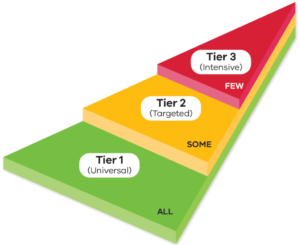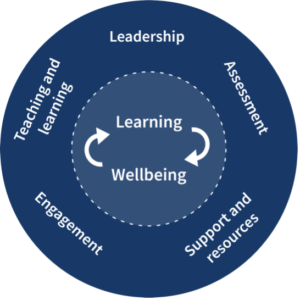What is School-wide positive behaviour support?
School-wide positive behaviour support (SWPBS) is a system for enhancing schools. It boosts student behaviour, well-being, and academic results. It focuses on preventing issues and using school resources wisely. SWPBS has a strong focus on explicitly teaching and acknowledging positive learning behaviours across the whole College.
What we know
Not all students come to us with an understanding of what appropriate behaviour is. Along with modelling, we must explicitly teach behaviours if we want our students to exhibit these expectations in our classrooms, yards and broader community. Students who exhibit and experience positive behaviour are able to learn more effectively, experience fewer social problems with their peers and are more likely to gain extended employment in the future.
When SWPBS is resourced and implemented schools have experienced between 20% – 60% less problematic behaviour. This change is able to be sustained over a longer period of time.
SWPBS works across a 3-tiered framework
Primary prevention (tier 1): supports for all students, staff and settings.
Secondary prevention (tier 2): additional specialised group systems for students with at-risk behaviour
Tertiary prevention (tier 3): specialised, individualised systems for students with high-risk behaviour, provided in addition to primary and secondary prevention.
The full concept of a SWPBS framework can take several years to implement. At Heathmont, we are at the beginning of our SWPBS journey, and we are currently exploring what our universal support system looks like.
Why do schools adopt SWPBS?
Schools adopt SWPBS for a range of reasons. Examples include:
- improving student behaviour and engagement
- enhancing school climate to be positive and safe
- increasing inclusive practices
- aligning instructional, well-being and mental health supports
- creating better relationships between staff, students and the community
- preventing and addressing bullying behaviour
SWPBS supports learning and wellbeing as outlined in the Framework for Improving Student Outcomes (FISO 2.0).
  |   |
Tier 1: Universal support at Heathmont College
Tier 1 supports include approaches to teaching positive behaviours to the whole school population. Every student across the college are exposed to these concepts in order to support their positive behaviour journey.
Acknowledging, Reinforcing and Recognising Expected Behaviours
When students demonstrate school wide expectations, staff will note their success with positive reinforcement. Two key components of our acknowledgement system are our ‘Compass Merit Awards’ and ‘Post Cards’.
Compass Merit Award
Staff at Heathmont College have the opportunity to acknowledge and recognise the positive behaviours of students by creating a merit award on the student’s Compass newsfeed. The merit award is visible to student and family through Compass.
How It Works:
- Teachers allocate a ‘Merit Award’ to a student who has demonstrated positive actions and behaviours.
- The teacher indicates on Compass which behaviour from the matrix the student has demonstrated and the specific details of the student’s behaviour.
- At the end of the term, we acknowledge and recognise the positive behaviours of students by sending home a SWPBS expectation postcard. The student and family receive the postcard through the mail.
Tier 2: Secondary Prevention at Heathmont College
Targeted Tier 2 supports are for students who present with challenging behaviours and need a bit more guidance as they navigate school life. Supports vary in this space, depending on the individualised needs of each student. Heathmont College engages in a number of these supports, including initiatives such as:
Hands on Learning
Students involved in the Hands-on Learning program work with a staff member outside of their regular classroom, engaging with tasks aligned to wood technology. Practicing both numeracy and literacy, this program attempts to connect basic numeracy and literacy requirements to physical tasks with real world alignment as the students find ways to contribute to the Heathmont community.
Peer mentoring
Students work in small groups with a number of the college captains in a weekly peer mentoring program. This peer-to-peer engagement allows students to practice respectful relationships and builds their social capacity and ability to meet expected behaviours.
Martial arts program
With students who have excess energy, the martial arts program allows students to physically exert themselves in a controlled environment. Under the supervision of a trained marshal art instructor students are taught to master themselves through disciplines of how to control thoughts, emotions, actions and responses. This program seeks to improve physical health of its participants and boost their self-confidence and regulation.
Targeted supports
Individualised supports can be offered to tailor appropriate supports for students. Examples include additional literacy and numeracy tutoring, adjustments of subjects and timetables, volunteer work and engagement with external providers.

